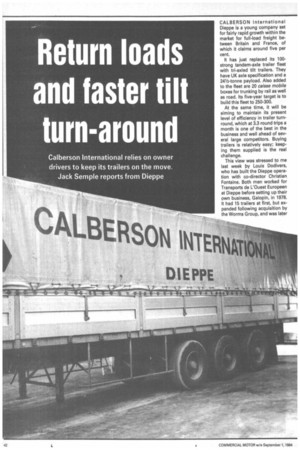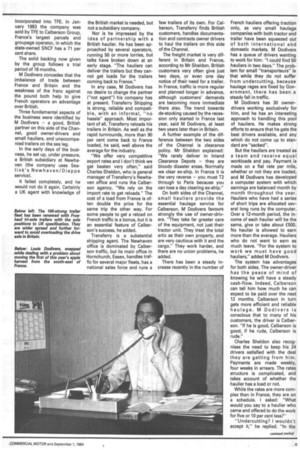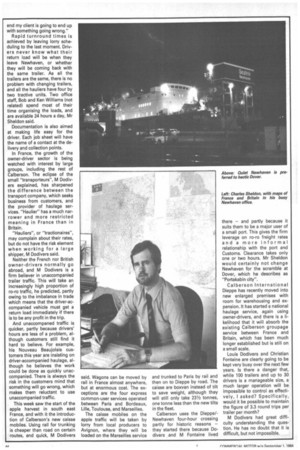Return loads and faster tilt turn-around
Page 44

Page 45

Page 46

If you've noticed an error in this article please click here to report it so we can fix it.
Calberson International relies on owner drivers to keep its trailers on the move. Jack Semple reports from Dieppe
CALBERSON International Dieppe is a young company set for fairly rapid growth within the market for full-load freight between Britain and France, of which it claims around five per cent.
It has just replaced its 100strong tandem-axle trailer fleet with tri-axled tilt trailers. They have UK axle specification and a 241/2-tonne payload. Also added to the fleet are 20 caisse mobile boxes for trunking by rail as well as road. Its five-year target is to build this fleet to 250-300.
At the same time, it will be aiming to maintain its present level of efficiency in trailer turnround, which at 3.3 round trips a month is one of the best in the business and well ahead of several large competitors. Buying trailers is relatively easy; keeping them supplied is the real challenge.
This view was stressed to me last week by Louis Dodivers, who has built the Dieppe operation with co-director Christian Fontaine. Both men worked for Transports de L'Ouest Europeen at Dieppe before setting up their own business, Galopin, in 1978. It had 15 trailers at first, but expanded following acquisition by the Worms Group, and was later incorporated into TFE. In January 1983 the company was sold by TFE to Calberson Group, France's largest parcels and groupage operator, in which the state-owned SNCF has a 71 per cent share.
The solid backing now given by the group follows a trial period of 16 months.
M Dodivers concedes that the imbalance of trade between France and Britain and the weakness of the franc against the pound both help to give French operators an advantage over British.
Three fundamental aspects of the business were identified by M Dodivers — a good, British partner on this side of the Channel, good owner-drivers and small hauliers, and unaccompanied trailers on the sea leg.
In the early days of the business, he set up, under pressure, a British subsidiary at Newhaven (the company uses Sealink's Newhaven/Dieppe service).
It failed completely, and he would not do it again. Certainly a UK agent with knowledge of the British market is needed, but not a subsidiary company.
Nor is he impressed by the idea of partnership with a British haulier. He has been approached by several operators, running 50 or more lorries, but talks have broken down at an early stage. "The hauliers can deliver the trailers but they cannot get loads for the trailers coming back to France."
In any case, M Dodivers has no desire to change the partner ("not agent") his company has at present. Transferry Shipping is strong, reliable and compatible, with an informal, "no hassle" approach. Most important of all, Transferry reloads his trailers in Britain. As well as the rapid turnrounds, more than 90 per cent come back to France loaded, he said, well above the average for the industry.
"We offer very competitive export rates and I don't think we get beaten very often," said Charles Sheldon, who is general manager of Transferry's Newhaven office and runs the Calberson agency. "We rely on the import rate to get reloads." The cost of a load from France is often double the price for the same trip the other way. For some people to get a reload on French traffic is a bonus, but it is an essential feature of Calberson's success, he added.
Transferry is a substantial shipping agent. The Newhaven office is dominated by Calberson traffic, but its main office in Hornchurch, Essex, handles traffic for several major fleets, has a national sales force and runs a few trailers of its own. For Calberson, Transferry finds British customers, handles documentation and contracts owner drivers to haul the trailers on this side of the Channel.
The freight market is very different in Britain and France, according to Mr Sheldon. British customers very often give just two days, or even one day notice of their need for a trailer. In France, traffic is more regular and planned longer in advance, although customers' demands are becoming more immediate there also. The trend towards de-stocking caused by the recession only started in France last year, said M Dodivers, at least two years later than in Britain.
A further example of the difference between the two sides of the Channel is clearance policy. Mr Sheldon explained: "We rarely deliver in Inland Clearance Depots — they are bloody disaster areas. Normally we clear ex-ship. In France it is the very reverse — you must 12 through to Paris because you can lose a day clearing ex-ship."
On both sides of the Channel, small hauliers provide the essential haulage service for Calberson. M Dodivers favours strongly the use of owner-drivers. "They take far greater care of the equipment, not just their tractor unit. They treat the total artic as their own property, and are very cautious with it and the cargo." They work harder, and there are no union problems, he added.
There has been a steady increase recently in the number of French hauliers offering traction only, as very small haulage companies with both tractor and trailer have been squeezed out of both international and domestic markets. M Dodivers has a queue of drivers wanting to work for him: "I could find 50 hauliers in two days." The problem for small "transporteurs" is that while they do not suffer from undercutting, because haulage rages are fixed by Government, there has been a steady fall in traffic.
M Dodivers has 30 ownerdrivers working exclusively for him, and he has an interesting approach to handling this pool of hauliers. He makes strong efforts to ensure that he gets the best drivers available, and any which do not come up to standard are "sacked".
But the hauliers are treated as a team and receive equal workloads and pay. Payment is made on a flat rate per mile, whether or not they are loaded, and M Dodivers has developed a computer system with which earnings are balanced month by month throughout the year. Hauliers who have had a series of short trips are allocated several long runs by the computer. Over a 12-month period, the income of each haulier will be the same, give or take about E500. No haulier is allowed to earn more than the average. Hauliers who do not want to earn as much leave. "For the system to work we must have good hauliers," added M Dodivers.
The system has advantages for both sides. The owner-driver has the peace of mind of knowing he will have a steady cash-flow. Indeed, Calberson can tell him how much he can expect to be paid over the next 12 months. Calberson in turn gets more efficient and reliable haulage. M Dodivers is conscious that to many of his customers, the driver is Calberson. "If he is good, Calberson is good, if he rude, Calberson is rude."
Charles Sheldon also recognises the need to keep his 24 drivers satisfied with the deal they are getting from him. Payments are made weekly, four weeks in arrears. The rates structure is complicated, and takes account of whether the haulier has a load or not.
While the rates are more complex than in France, they are on a schedule. I asked: "What would you say to a haulier who came and offered to do the work for five or 10 per cent less?"
"Undercutting? I wouldn't accept it," he replied. "In the end my client is going to end up with something going wrong."
Rapid turnround times is achieved by leaving lorry scheduling to the last moment. Drivers never know what their return load will be when they leave Newhaven, or whether they will be coming back with the same trailer. As all the trailers are the same, there is no problem with changing trailers, and all the hauliers have four by two tractive units. Two office staff, Bob and Ken Williams (not related) spend most of their time organising the loads, and are available 24 hours a day, Mr Sheldon said.
Documentation is also aimed at making life easy for the driver. Each job sheet will have the name of a contact at the delivery and collection points.
In France, the growth of the owner-driver sector is being watched with interest by large groups, including the rest of Calberson. The eclipse of the small "transporteurs", M Dodivers explained, has sharpened the difference between the transport company, which seeks business from customers, and the provider of haulage services. "Haulier" has a much narrower and more restricted meaning in France than in Britain.
"Hauliers", or "tractionaires", may complain about their rates, but do not have the risk element when working for a large shipper, M Dodivers said.
Neither the French nor British owner-drivers normally go abroad, and M Dodivers is a firm believer in unaccompanied trailer traffic. This will take an increasingly high proportion of ro-ro traffic, he predicted, partly owing to the imbalance in trade which means that the driver-accompanied vehicle must get a return load immediately if there is to be any profit in the trip.
And unaccompaned traffic is quicker, partly because drivers' hours are less of a problem, although customers still find it hard to believe. For example, his Nouveau Beaujolais customers this year are insisting on driver-accompanied haulage, although he believes the work could be done as quickly unaccompanied. There is always the risk in the customers mind that something will go wrong, which makes them reluctant to use unaccompanied traffic.
This week saw the start of the apple harvest in south east France, and with it the introduction of Calberson's new caisse mobiles. Using rail for trunking is cheaper than road on certain routes, and quick, M Dodivers said. Wagons can be moved by rail in France almost anywhere, but at enormous cost. The exceptions are the four express common-user services operated between Paris and Bordeaux, Lille, Toulouse, and Marseilles.
The caisse mobiles on the apple traffic will be taken by lorry from local producers to Avignon, where they will be loaded on the Marseilles service
and trunked to Paris by rail and then on to Dieppe by road. The caisse are boxvan instead of tilt to save weight, although they will still only take 231/2 tonnes, one tonne less than the new tilts in the fleet.
Calberson uses the Dieppe/Newhaven four-hour crossing partly for historic reasons — they started there because Dodivers and M Fontaine lived there — and partly because it suits them to be a major user of a small port. This gives the firm leverage on ro-ro freight rates and a more informal relationship with the port and Customs. Clearance takes only one or two hours. Mr Sheldon would certainly not change Newhaven for the scramble at Dover, which he describes as "Portakabin city".
Calberson International Dieppe has recently moved into new enlarged premises with room for warehousing and expansion. It has started a national haulage service, again using owner-drivers, and there is a likelihood that it will absorb the existing Calberson groupage service between France and Britain, which has been much longer established but is still on a small scale.
Louis Dodivers and Christian Fontaine are clearly going to be kept very busy over the next few years. Is there a danger that, while 100 trailers and up to 30 drivers is a manageable size, a much larger operation will be impossible to control as effectively, I asked? Specifically, would it be possible to maintain the figure of 3.3 round trips per trailer per month?
M Dodivers had great difficulty understanding the question. He has no doubt that it is difficult, but not impossible.




















































































